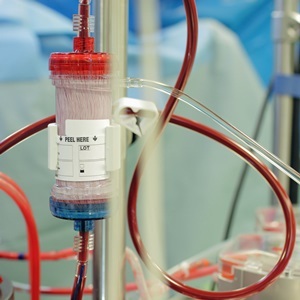
This figure is on par with patients receiving conventional blood transfusions.
What is artificial blood?
A blood alternative, also known as artificial blood, is used in instances where blood supply is not available, or when a patient cannot use blood products.
It basically allows for the delivery of oxygen when compatible red blood cells (those that usually transport oxygen) are not readily available, and may eliminate, avoid or delay the need for urgent transfusion.
There may also be a doctor or patient preference for blood avoidance (in the case of religious objection), or the patient may have built up antibodies to blood, which may reject or be resistant to blood transfusion.
"It is not a blood replacement – it acts as an oxygen bridge until suitable blood becomes available," says Dr Mandisa Maholwana, country manager for Biopure SA, which is the producer of Hemopure – the only blood alternative product currently available in South Africa.
After the blood alternative is administered and suitable blood becomes available, patients can still be given a red blood cell transfusion.
Hemopure is basically a purified haemoglobin in salt water solution that is extracted from cow blood and formulated for use in the human body by means of a chemical process.
"It is a cell-free solution," says Mackenzie. "It provides oxygenation of tissue when there isn't enough oxygen-carrying haemoglobin in the blood."
It is still important to donate blood
"It only provides a bridge during the time that blood might not be available in remote or rural locations, or in emergency situations," explains Dr Colin Mackenzie, Professor of Anaesthesiology at the Shock Trauma Centre of the University of Maryland School of Medicine.
"It is intended to support the use of blood, and we're not suggesting that people stop the collection of blood for blood transfusion."
What are the benefits?
A blood alternative also have some other benefits:
- It can be used by any blood type.
- It doesn't need special cooling storage facilities and can last for up to three years at room temperature.
- It is sterile, eliminating the risk of disease transmission.
- It is immediately available.
Blood alternatives in South Africa
The blood alternative Hemopure is approved by the Medicines Control Council in South Africa and has been available an in use in the country since 2001. It is available in the private as well as the public health sectors, and more than 500 patients are known to have received it since.
"It has been widely used in the private and public sectors," says Maholwana.
Side effects
As do all drugs, a blood alternative also has some minor side effects. It may increase the blood pressure slightly, and it may also cause some changes in the skin colour and the gastrointestinal system.
"All these changes are relatively minor and short-lived," says Mackenzie. "So the risk of side effects has to be weighed against the benefits of either saving a life, or sustaining oxygen carriage and preventing organ damage."
(Wilma Stassen, Health24)
Read more:
Self-donation of blood
Why you should donate blood




 Publications
Publications
 Partners
Partners









